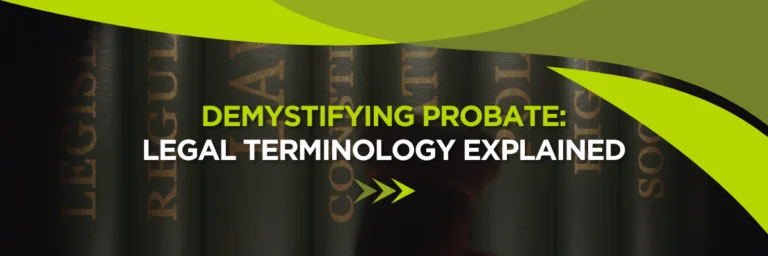Demystifying Probate: Legal Terminology Explained

Learn the most common probate terms explained in plain language. Understand key legal terminology to navigate the probate process with confidence and clarity.
What Is Probate?
Probate is the court-supervised process of administering a person’s estate after they pass away. During probate, the court ensures that the deceased person’s debts are paid and their remaining assets are distributed according to their will—or, if there is no will, according to state law.
For many families, probate can feel overwhelming due to the legal procedures and terminology involved. Understanding the key terms used in probate can make the process less intimidating.
Key Probate Terms You Should Know
- Decedent
The person who has passed away, leaving behind property, debts, or both.
- Estate
All the assets, property, and debts left behind by the decedent. This may include bank accounts, real estate, personal property, and investments.
- Executor / Personal Representative
The individual appointed to administer the estate. In Florida, this role is often called a personal representative. Their duties include paying debts, handling taxes, and distributing assets to beneficiaries.
- Beneficiary / Heir
A beneficiary is someone named in a will to receive assets. An heir is someone entitled to inherit under state law if there is no will.
- Intestate
When someone dies without a valid will, they are said to have died intestate. In this case, state law determines who inherits the estate.
- Letters of Administration
A court document issued to the personal representative, granting them legal authority to act on behalf of the estate.
- Inventory
A detailed list of the decedent’s assets that must be filed with the court.
- Probate Assets vs. Non-Probate Assets
- Probate assets are those that require court supervision to be transferred (such as property held only in the decedent’s name).
- Non-probate assets pass directly to beneficiaries, such as life insurance policies with designated beneficiaries or jointly owned property.
Creditor’s Claims
Creditors have the right to make claims against the estate for unpaid debts. The personal representative must notify creditors and resolve valid claims.
Why Understanding Probate Terms Matters
For families going through probate, the unfamiliar terminology can add confusion to an already emotional time. By learning the language of probate, you can better understand your rights, responsibilities, and what to expect during the process.
Probate doesn’t have to feel like a mystery. With the right knowledge—and the guidance of an experienced probate attorney—you can navigate the process with clarity and confidence. Understanding key legal terms is the first step toward easing the stress of probate and ensuring your loved one’s estate is handled properly.
We serve the entire state of Florida so call us at (305) 962-5929 with any questions you may have or clicking here to speak with our team.



